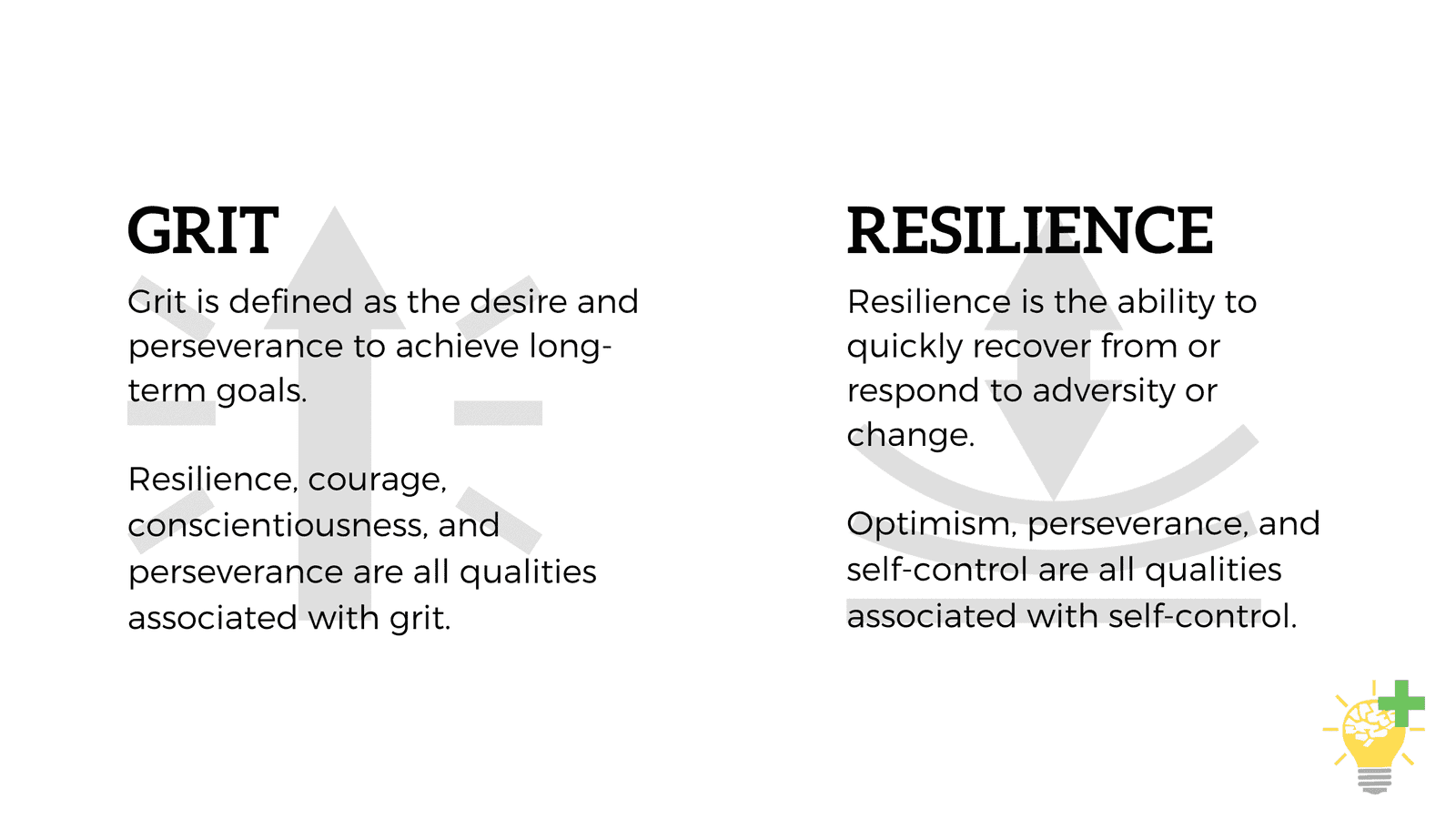So a few days ago, I wrote a post about resilience and the term “grit” kept coming to mind. Grit was a term that I heard growing up, but I don’t hear it used that frequently anymore.
I thought you might be interested in knowing the difference between resilience and grit.
Grit is a stick-to-itiveness that keeps you from stopping just short of your goal. It’s what keeps you grinding day-after-day no matter what. In some cases, going on auto-pilot mode is a part of it.
On the other hand, resilience bounces back from challenges; it’s all about getting stronger and stronger with every challenge. You stay out of auto-pilot and let life and the situations at hand teach you so that you can use the new knowledge so that it becomes wisdom.
You can read my post on personal resilience: 8 Examples of Personal Resilience
Let’s look at why grit and resilience are important and some examples and tips to improve the level of resilience and the level of grit in our lives.
What Is The Role of Grit and Resilience
Many people have heard about grit and resilience but don’t know how they can apply them in their lives. I believe that these traits are fundamental to success in life.
Here are two reasons why I think this way:
1) They increase your ability to deal with setbacks.
2) They help you become more independent.
So if we want to be successful in life, we need to work on both things.
I have already identified what grit is and what resilience is.

How Do We Know If Someone Has Grit or Not?
There are many different ways to measure whether someone has grit or not. Here are three ways to determine if you have grit:
1) How good are you at dealing with adversity?
2) How good are you when faced with failure?
3) How strong are you after facing hardship?
How Can We Apply These Traits To Our Lives?
If we want to grow into better versions of ourselves, we must practice these traits daily.
For example, if you want to get better at something, you need to keep practicing until you master it. This is true for everything in life.
Many studies show that the best athletes and musicians are those who practice the most.
The same thing applies to us. When we go through hard times, we should try to learn from them.
We should also make sure that we’re always trying to improve ourselves.
This means that we shouldn’t stop learning even though we’ve mastered specific skills.
We should always be looking for ways to improve ourselves.
How Do You Develop Grit and Resilience
A lot of people are afraid of failure. They don’t want to fail because they fear losing their job or being embarrassed by their family members. But if you’re going to be successful in life, you have to learn how to deal with failure.
It’s like playing sports. You can’t expect to win without having to face defeat first.
When you play basketball, you need to shoot thousands of shots before you start scoring points. It would be best if you did the same thing with life.
Start small and build up slowly so that you can avoid falling.
As soon as you feel comfortable enough to take on more significant challenges, you’ll be able to overcome whatever comes your way.
How Do You Build Resilience and Grit
Resilience and grit are two qualities that help people overcome adversity and thrive despite challenges. Resilient individuals can bounce back from setbacks, while gritty individuals persevere through difficult situations.
Grit isn’t just a personality trait; it’s a skill. It takes time to develop, but you’ll find that you can use it to achieve success once you do.
You can develop resilience and grit by focusing on the following areas:
– Your mindset
– Your social network
– Your physical health
Let’s look at each one of these in detail.
Your Mindset
The first step towards developing resilience and grit is to think positively about yourself and your world.
One study found that resilient people tend to focus on the positive aspects of themselves and others.
They see the bright side of life instead of dwelling on all its problems.
They also pay attention to what other people are thinking and feeling.
Instead of worrying about negative things, resilient people worry more about what will happen next.
They focus on positive changes rather than staying stuck in the past.
When you focus too much on the negatives, it makes you depressed and unhappy.
On the other hand, when you focus on the positives, you become happier and more optimistic.
So the first step towards building resilience and grit is to change your mindset.
This is how you can cultivate resilience and grit.
Build Your Social Network
Another important factor in building resilience and grit is having strong relationships with friends and family.
Studies show that people who spend time with their loved ones are less likely to experience depression or anxiety.
Having a support system can help you cope with stressful events.
It can also boost your confidence and motivate you to keep going.
Here are some ways to build your social network:
– Spend time with people who inspire you
– Join clubs or organizations where you can meet new people
– Get involved in community activities
– Volunteer
These actions will help you create stronger connections with those around you.
Remember, everyone has different needs and wants. So don’t force yourself to spend time with someone just because they’re your friend.
Make sure you choose your friends wisely.
Focus More On Yourself And Less On Others
Your Physical Health
Finally, another key part of building resilience and grit is making sure you stay physically fit.
A healthy body helps you manage stress better.
It also gives you energy for everything else you need to accomplish.
If you want to improve your physical fitness, here are some tips:
– Walk regularly
– Do strength training exercises
– Eat nutritious foods
– Drink lots of water
– Sleep well
If you follow this advice, you’ll be able to handle almost whatever comes your way.
Why Is Grit Important in Life
When it comes to getting things done and having success in life, the effort is worth twice as much as talent.
This is how to break down the Grit Formula into its parts.
Skill is the sum of talent and effort.
The sum of skill and effort is what you get.
Grit is important because it drives success and achievement even if you have a lot of talent or are smart.
Start at the bottom if you aren’t as good as your friends. But if you have a lot of grit, you can make up for it.
Success doesn’t come in a straight line but instead grows exponentially, which means that you need to see through setbacks and keep going to break through performance plateaus.
For people to do well and thrive, it is vital to have a lot of persistence.
Without that, talent isn’t used to its full potential most of the time. Only with hard work can talent become a skill that leads to success.
“Without grit, talent may be nothing more than unmet potential.”
– Angela Duckworth
On the other hand, Grit helps people grow and deal with failures in life. To become more successful in life, it is important to try and fail.
Approaching failure with a tough mindset helps you bounce back faster from setbacks. Building up your grit might be more challenging if you have never really failed at something.
Because of this, it is important to treat yourself with kindness and start shifting your mindset from what the outcome will be to what you will do.
Here is a great TED talk from Angela Duckworth:
Why is Grit Important in Our Lives
5 Characteristics of Grit
Here are examples of grit that you can use to determine how you will get through difficult things and how you can improve.
1. Courage
Physical bravery comes to mind when you think of courage, but there are many other sorts. After all, courage is the triumph over fear.
Taking a risk when others won’t; following your dreams no matter where they go; standing up for what you believe in, even if it’s controversial; or doing the right thing when more accessible options abound.
Patience, belief in the impossible, and the fortitude to say “no” are characteristics of bold people. They aren’t afraid to take a stand or ask for support.
They can forgive and move on fast and stay the course when others have given up.
2. Consciousness
Consciousness is being thorough, careful, or watchful. Consciousness people have integrity efficient and organized, not resting until the job is done perfectly.
To do the right thing is important to the conscientious, and thoughts and convictions are rarely taken lightly. They are also perfectionists who like to do something “right”. A conscientious person is also dedicated to working and capable of concentrated effort. They are good organizers, catalogers, and list makers.
Finally, conscientious people hold fast to their beliefs and attitudes despite adversity.
3. Perseverance
Many people associate perseverance with pain and misery, while individuals with true grit can consider adversity as a gateway to joy.
Perseverance means to start and keep going towards any goal you choose, and it is often the difference between failure and success. The difference between someone who succeeds and who merely practices a lot is that practice must be purposeful.
Long-term goals help with that.
They give purpose and value to your long-term efforts, which helps create drive, sustainability, passion, courage, stamina… grit.
Related: Resilience vs. Perseverance: What’s The Difference?
4. Resilience
Resilience is “toughness” — the ability to bounce back rapidly from setbacks.
Optimists are more resilient than pessimists on average—the ability to laugh at oneself and perceive the lighter side of situations and experiences.
The moral compass or set of beliefs of resilient people tends to be unshakeable. They recognize they are their own best judge of success. They perceive obstacles as opportunities for growth.
Finally, they don’t control their life, instead of self-awareness and attentiveness. Affirmations and goals are adjusted to the current wave size.
5. Passion
Passion creates excellence where mediocrity exists.
Passionate people are unselfish and have a strong sense of purpose. They also know themselves and live by their ideals and convictions. They perceive life as a series of possibilities and choices and accept themselves imperfect.
They are result-driven and goal-driven. Nothing can stop them – they don’t take “no” for an answer.
Eager to celebrate others’ successes, they are themselves.
Finally, they own their life yet aren’t hesitant to seek help when they need it. Life is a journey, and passionate people understand that they are in control of their destiny.
Final Thoughts About Resilience and Grit
Grit is about persistence, resilience, and staying power. It’s not just about being tough; it’s about having the will to stick it out.
It’s about making the most of every opportunity, no matter how difficult or challenging it may seem.
It’s about doing what needs to be done even if it seems impossible.
It’s about keeping moving forward even when you feel frustrated or discouraged.
And it’s about believing that you can achieve anything you want.
So, what does this mean to you?




